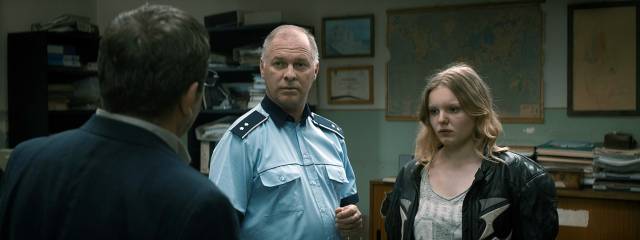
The Romanian Film Initiative and the Jacob Burns Film Center will be presenting the 11th edition of Making Waves: New Romanian Cinema from December 1-8. Our critics discuss four essential films of the 2016 edition.
Dogs
In Dogs, a young man from the city (Dragos Bucur) inherits a massive piece of land in the barren Romanian countryside from his late grandfather, a known murderous crime lord. Intent on selling off the land, he’s met with opposition from the charmingly sinister newly crowned boss Samir (Vlad Ivanov) who is willing to prevent the sale by any means necessary. The Chief of Police (Gheorghe Visu), an old man weathered and beaten down by an entire career of being one step behind the local crime lords, works against the clock to put an end to it all. Long single coverage shots, vulnerable true to life characters and moody atmosphere all work together to make director Bogdan Mirica’s first feature feel extraordinarily real. This patient western thriller, broken up by short outbursts of violence that are timed so well they leave imprints on your mind, establishes a sense of dread from the get that lasts until the satisfying inevitable conclusion. - Joseph Hernandez
This documentary pairs the desolate landscape of a declining post-communist town with the slow-motion tragedy of the disappearing ‘movie-going public’. The movie opens by noting that during under Romania's state-controlled economy, four-hundred theaters existed, but the country now has only thirty. The focus here is on a family affair called the Dacia Cinema, which basically runs private screenings for small groups, and provides tea and blankets in lieu of heating. Purportedly a movie about cinephilia, for the most part if feels like a movie about how sad it is to try and urge people to see movies. Please, just go to one! - Athena Bryan
 Graduation
Graduation
Cristian Mungiu's gripping drama unfolds like a thriller, made all the most fascinating because the stakes are completely non-cinematic. Essentially a tale about parents wanting their children to succeed, the film centers on how a successful doctor (Adrian Titieni) will do anything to ensure his daughter (Maria Drăguş) gets into the foreign university she wants to attend. Concerned with his daughter's future in a country where he feels all hope is lost, the doctor is willing to put his own ethical code on hold even when he must deal with some of the most corrupt people he knows. Mungiu's keen eye for how the ordinary can achieve unexpected magnitude makes the film both heartbreaking and thrilling, the ending being one of those that will haunt you for weeks after watching the film. - Jose Solis
Illegitimate opens with a lively discussion between precocious, mostly-grown children and the droning patriarch of the family. Cackling about Plato soon gives way to a heated confrontation of their father for informing on illegal abortion providers under Ceausescu. Sitaru's camera tends to remain in one position for the length of a scene, limiting himself to swinging between interlocutors or zooming into reactions. It’s as though you are squatting in the corner, watching the dysfunctional clan in action. Said dysfunction is compounded when two of the children, fraternal twins, incestuously conceive a child. It is a gripping and wonderfully executed movie. - Athena Bryan
For more information on Making Waves: New Romanian Cinema click here.